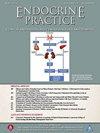Life-Saving Drug or Potential Threat? The Role of Mineralocorticoid Receptor Antagonists in Myocardial Infarction: A Meta-Analysis
IF 3.7
3区 医学
Q2 ENDOCRINOLOGY & METABOLISM
引用次数: 0
Abstract
Mineralocorticoid receptor antagonists (MRAs) have been studied as a potential therapeutic option to improve outcomes in patients with myocardial infarction (MI). Although several randomized controlled trials have evaluated the effectiveness of MRAs in post-MI patients, the specific effects remain debated. We systematically searched databases including Web of Science, PubMed, Embase, and Cochrane Library. The primary efficacy outcome was death from any cause. Secondary efficacy outcomes included death from cardiovascular causes, death from MI, and others. Subgroup analyses were performed based on the presence of heart failure and the type of MRA used. Safety outcomes included hyperkalemia, hypokalemia, breast tenderness, and gynecomastia. A total of 13 randomized controlled trials involving 17 851 patients were included. The results demonstrated that MRAs significantly reduced the risk of death from any cause (relative risk [RR] 0.87; 95% CI 0.79-0.95; P = .004). Subgroup analysis indicated that the effectiveness of MRAs varied based on the presence of heart failure. MRAs significantly reduced the risk of death from cardiovascular causes in heart failure patients (RR 0.87; 95% CI 0.78-0.97), but had no significant effect in patients without heart failure (RR 0.69; 95% CI 0.34-1.38). Furthermore, subgroup analysis based on different MRA drugs showed varying effects on outcomes. While some adverse events, such as hyperkalemia (RR 1.95; 95% CI 1.55-2.46; P < .01), were significantly more frequent, other safety events did not show significant differences. MRAs improve cardiovascular outcomes in MI patients, especially in those with heart failure. When choosing a specific MRA drug, eplerenone or spironolactone is recommended.
救命药还是潜在威胁?矿皮质激素受体拮抗剂在心肌梗死中的作用:一项荟萃分析。
矿皮质激素受体拮抗剂(MRAs)已被研究作为改善心肌梗死(MI)患者预后的潜在治疗选择。尽管一些随机对照试验已经评估了mra在心肌梗死后患者中的有效性,但其具体效果仍存在争议。我们系统地检索了Web of Science、PubMed、Embase和Cochrane Library等数据库。主要疗效终点为任何原因导致的死亡。次要疗效结局包括心血管原因死亡、心肌梗死死亡和其他原因死亡。根据心力衰竭的存在和所使用的MRA类型进行亚组分析。安全性指标包括高钾血症、低钾血症、乳房压痛、男性乳房发育。共纳入13项随机对照试验,涉及17,851例患者。结果表明,MRAs显著降低了任何原因导致的死亡风险(RR 0.87;95% ci 0.79-0.95;P = 0.004)。亚组分析表明,MRAs的有效性因心力衰竭的存在而异。MRAs显著降低心力衰竭患者心血管原因死亡的风险(RR 0.87;95% CI 0.78-0.97),但对无心力衰竭患者无显著影响(RR 0.69;95% ci 0.34-1.38)。此外,基于不同MRA药物的亚组分析显示对结果的影响不同。而一些不良事件,如高钾血症(RR 1.95;95% ci 1.55-2.46;P < 0.01),发生率显著高于对照组,其他安全事件无显著差异。MRAs可改善心肌梗死患者的心血管预后,尤其是心力衰竭患者。当选择特定的MRA药物时,推荐使用依普利酮或螺内酯。
本文章由计算机程序翻译,如有差异,请以英文原文为准。
求助全文
约1分钟内获得全文
求助全文
来源期刊

Endocrine Practice
ENDOCRINOLOGY & METABOLISM-
CiteScore
7.60
自引率
2.40%
发文量
546
审稿时长
41 days
期刊介绍:
Endocrine Practice (ISSN: 1530-891X), a peer-reviewed journal published twelve times a year, is the official journal of the American Association of Clinical Endocrinologists (AACE). The primary mission of Endocrine Practice is to enhance the health care of patients with endocrine diseases through continuing education of practicing endocrinologists.
 求助内容:
求助内容: 应助结果提醒方式:
应助结果提醒方式:


